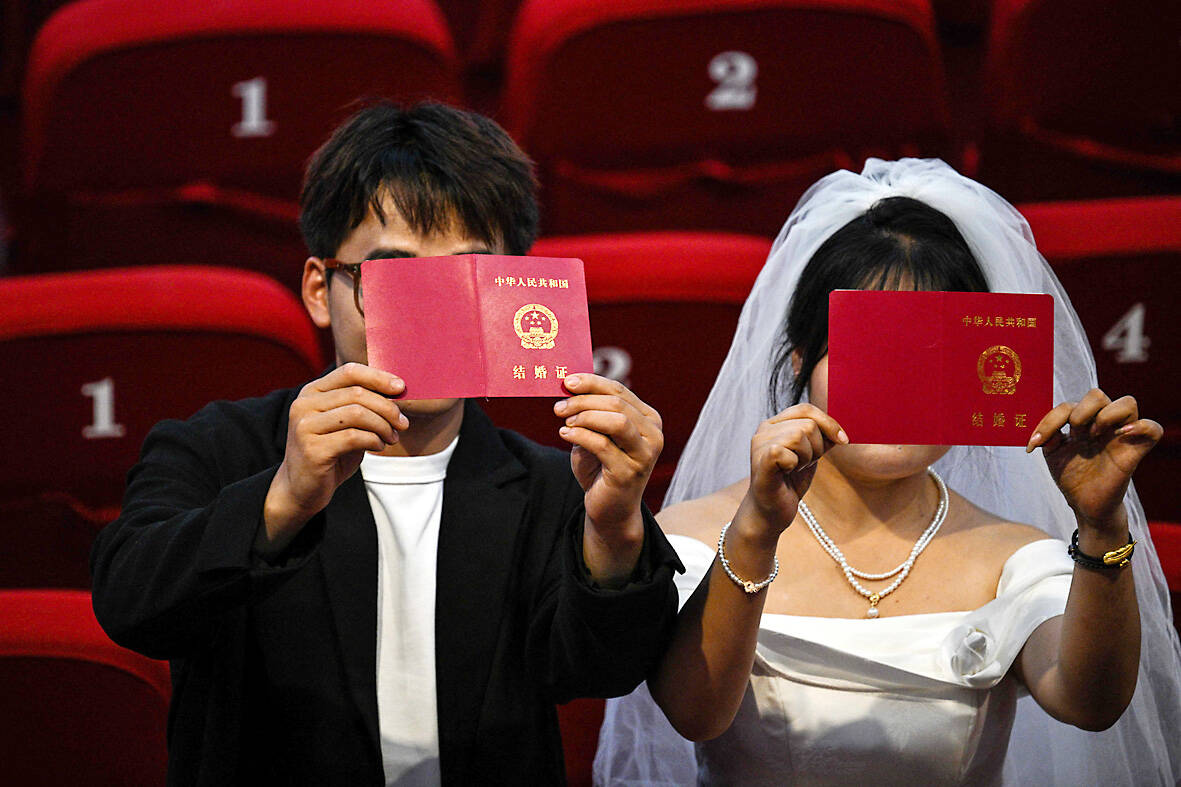Chinese medical office worker Qin Meng has found a lucrative side-hustle: she wakes up before midnight, fills in her clients’ divorce certificate applications on a government website, then hits the confirm button exactly at the top of the hour.
Miss it by seconds and the daily slots are “gone in the blink of an eye,” says the 30-year-old, who charges 400 yuan (US$56) for her service, bringing relief to couples who have sometimes spent six months trying for a slot.
Demographers say the emergence of impromptu agents like Qin, who advertise on Chinese social media, is another sign of how the slowing economy is piling financial stress on married couples and contributing to the breakdown of relationships.

Photo: Reuters
The 2024 divorce rate has yet to be announced by the National Bureau of Statistics, but Yi Fuxian, a Chinese demographer and senior scientist at University of Wisconsin-Madison, expects it to hit 2.6 per 1,000 people, against a low of 2.0 during the COVID-19 pandemic. This compares with the most recent rates of 1.5 in Japan and 1.8 in South Korea.
“Poverty destroys marriage,” said Yi, warning divorce numbers were inversely correlated with birth rates and could worsen the country’s demographic crisis.
“China’s economic downturn in recent years and the rising youth unemployment rate have reduced the economic capacity of families, exacerbated family conflicts and thereby increased the divorce rate.”

Photo: AFP
While the economy is expanding at about 5 percent a year, Chinese households have been saving more because of concerns about job security and the impact of a prolonged property crisis.
Much of the economic growth has relied on export competitiveness, but Chinese firms, hit by US tariffs, have cut jobs or lowered pay to reduce costs, while millions of fresh university graduates are struggling to find work.
The rising financial pressure was thrust into the spotlight last year after a driver rammed his car into a crowd, killing 35 people in what was the country’s deadliest attack in recent history.
The court found that at the time of his offence, the driver was angry with his divorce settlement. He was sentenced to death.
Soon after, the bi-monthly Communist Party magazine Qiushi re-published a 2016 speech by President Xi Jinping that argued “harmonious families lead to a stable society.”
FINANCIAL STRAIN
In a further sign that the rebound in divorces is driven by financial strain, demographers point to data showing lower divorce rates in affluent coastal areas and higher ones in poorer inner and northern regions.
Zhou Minghui booked her divorce appointment herself on the fifth attempt, after weeks of worry that her ex-husband might change his mind about their separation.
Zhou said her motivation for divorce was what she described as her ex’s “reckless financial investments.” He had lost nearly four million yuan in the stock market in the space of three years, forcing the couple to sell their home, she said. Even then, they were only able to repay just over half of the debt he had taken to buy the shares.
“When the economy is in a downturn, people shouldn’t be so eager to invest or consume,” said 38-year-old Zhou, who works in the education industry in the southern city of Shenzhen.
The COVID-era drop in divorce appears increasingly like an anomaly. Demographers say it was the result not only of the shutdown of non-essential public services, but also by the 2021 introduction of a 30-day mandatory cool-off period for couples seeking amicable divorce outside the courts.
Couples need to get on the Civil Affairs Department’s website twice — before and after that month-long breather — to book appointments to register their divorce. But the demand now far exceeds the available daily slots.
The agents, people like Qin, have figured this out and advertise their services for anything from 50 yuan to 999 yuan.
Qin has earned 5,000 yuan, nearly half her monthly salary from her day job, since she started the side gig “for fun” in March. She receives multiple daily enquiries and expects to earn much more.
“The economy is not great, so there’s more pressure at work and more conflicts in marriage,” Qin said. “Divorce rates will keep rising.”

Google unveiled an artificial intelligence tool Wednesday that its scientists said would help unravel the mysteries of the human genome — and could one day lead to new treatments for diseases. The deep learning model AlphaGenome was hailed by outside researchers as a “breakthrough” that would let scientists study and even simulate the roots of difficult-to-treat genetic diseases. While the first complete map of the human genome in 2003 “gave us the book of life, reading it remained a challenge,” Pushmeet Kohli, vice president of research at Google DeepMind, told journalists. “We have the text,” he said, which is a sequence of

On a harsh winter afternoon last month, 2,000 protesters marched and chanted slogans such as “CCP out” and “Korea for Koreans” in Seoul’s popular Gangnam District. Participants — mostly students — wore caps printed with the Chinese characters for “exterminate communism” (滅共) and held banners reading “Heaven will destroy the Chinese Communist Party” (天滅中共). During the march, Park Jun-young, the leader of the protest organizer “Free University,” a conservative youth movement, who was on a hunger strike, collapsed after delivering a speech in sub-zero temperatures and was later hospitalized. Several protesters shaved their heads at the end of the demonstration. A

Every now and then, even hardcore hikers like to sleep in, leave the heavy gear at home and just enjoy a relaxed half-day stroll in the mountains: no cold, no steep uphills, no pressure to walk a certain distance in a day. In the winter, the mild climate and lower elevations of the forests in Taiwan’s far south offer a number of easy escapes like this. A prime example is the river above Mudan Reservoir (牡丹水庫): with shallow water, gentle current, abundant wildlife and a complete lack of tourists, this walk is accessible to nearly everyone but still feels quite remote.

In August of 1949 American journalist Darrell Berrigan toured occupied Formosa and on Aug. 13 published “Should We Grab Formosa?” in the Saturday Evening Post. Berrigan, cataloguing the numerous horrors of corruption and looting the occupying Republic of China (ROC) was inflicting on the locals, advocated outright annexation of Taiwan by the US. He contended the islanders would welcome that. Berrigan also observed that the islanders were planning another revolt, and wrote of their “island nationalism.” The US position on Taiwan was well known there, and islanders, he said, had told him of US official statements that Taiwan had not